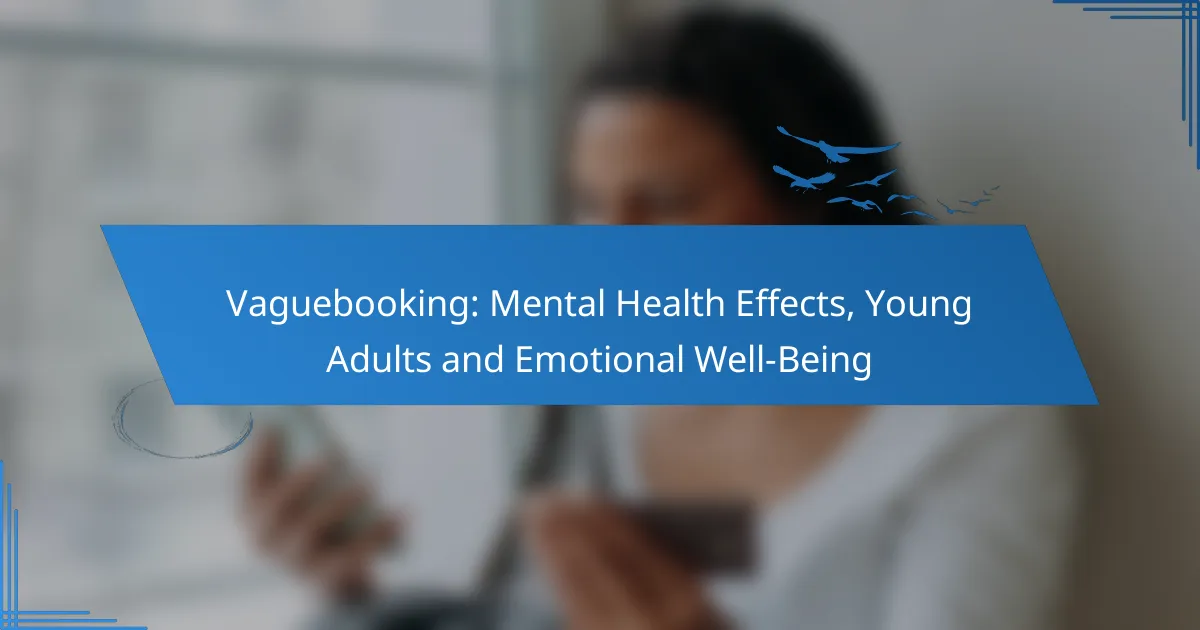Vaguebooking, the practice of sharing unclear or ambiguous posts on social media, can have profound effects on the mental health of young adults. This behavior often contributes to increased anxiety, lowered self-esteem, and a sense of loneliness, as individuals navigate the complexities of online validation and communication. Understanding these emotional consequences is crucial for fostering healthier social media habits and promoting overall emotional well-being.
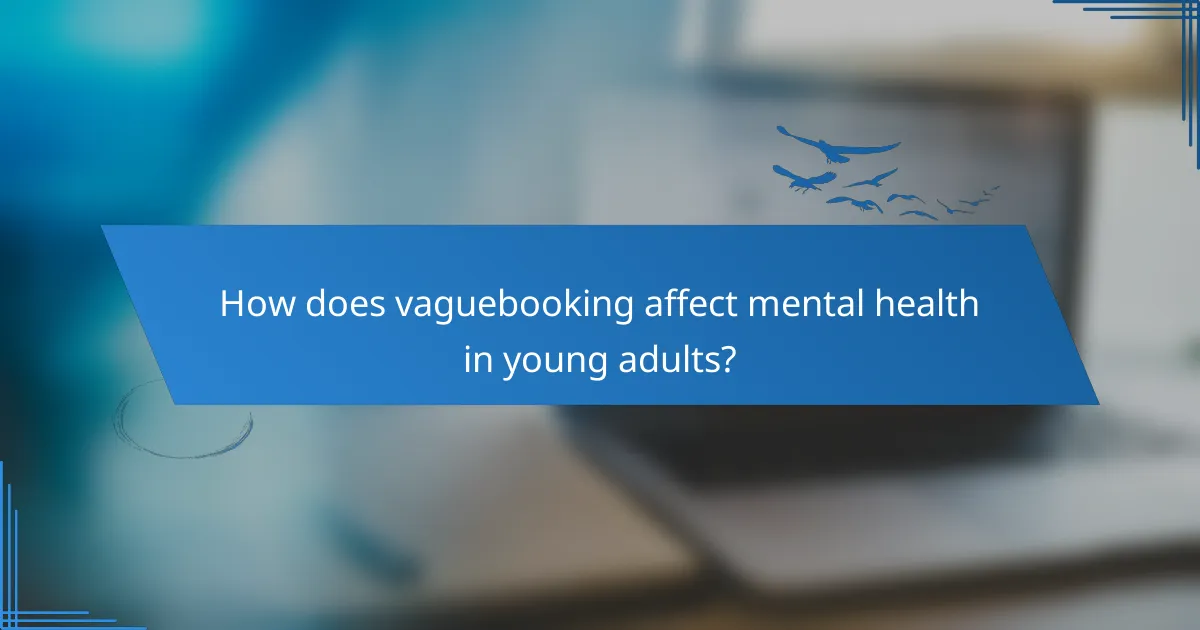
How does vaguebooking affect mental health in young adults?
Vaguebooking, the act of posting ambiguous or unclear messages on social media, can significantly impact the mental health of young adults. It often leads to increased anxiety, lowered self-esteem, and heightened feelings of loneliness as individuals seek validation and clarity in their online interactions.
Increased anxiety levels
Vaguebooking can lead to increased anxiety levels among young adults as they may feel pressured to interpret or respond to unclear posts. The uncertainty surrounding these messages can create a cycle of worry, where individuals constantly seek reassurance from peers or feel compelled to engage in discussions that leave them feeling unsettled.
Moreover, the fear of missing out (FOMO) can exacerbate anxiety, as vague posts may hint at social situations or emotional struggles that others are experiencing. This can lead to a sense of exclusion and further anxiety about one’s own social standing.
Lowered self-esteem
Young adults may experience lowered self-esteem as a result of vaguebooking, particularly when they perceive their posts are not receiving the attention or validation they desire. This can create a negative feedback loop, where the lack of engagement leads to feelings of inadequacy and self-doubt.
Additionally, comparing oneself to others who seem to receive more positive responses can further diminish self-worth. The constant need for external validation through vague posts can make young adults feel less confident in their own identities and achievements.
Heightened feelings of loneliness
Vaguebooking can heighten feelings of loneliness, as the ambiguous nature of these posts often fails to foster genuine connections. While individuals may seek support through vague messages, the lack of clarity can lead to misunderstandings and superficial interactions, leaving them feeling more isolated.
Furthermore, the tendency to engage in vaguebooking may prevent young adults from expressing their true emotions and seeking meaningful conversations. This avoidance can result in a deeper sense of loneliness, as they may struggle to form authentic relationships in both online and offline spaces.
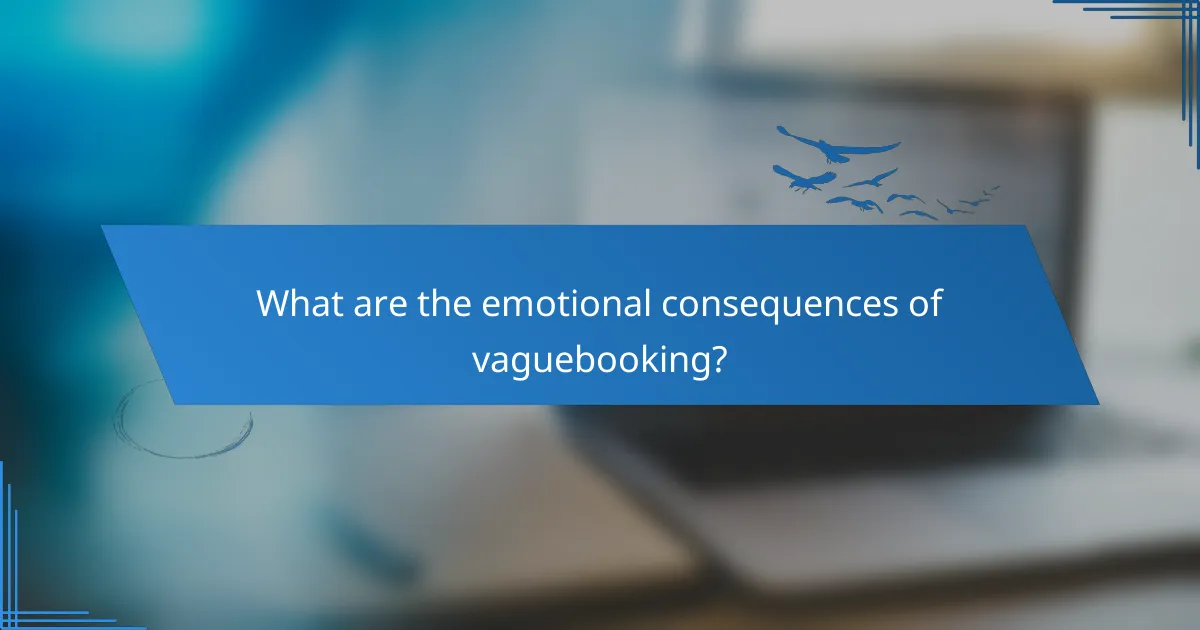
What are the emotional consequences of vaguebooking?
The emotional consequences of vaguebooking can include feelings of confusion, anxiety, and frustration among both the poster and their audience. This behavior often leads to misunderstandings and can negatively impact emotional well-being, particularly for young adults seeking validation or support.
Emotional distress
Vaguebooking can trigger significant emotional distress, as individuals may feel isolated or misunderstood when their cryptic posts do not elicit the desired responses. This lack of clarity can lead to increased anxiety, as users may obsess over how others interpret their messages.
Moreover, the anticipation of reactions can create a cycle of stress. Young adults, in particular, may find themselves caught in a loop of posting vague updates and then feeling disappointed by the lack of engagement or supportive comments.
Social comparison
Social comparison is a common issue associated with vaguebooking, as individuals often measure their emotional states against the ambiguous posts of others. This can lead to feelings of inadequacy, especially when users perceive that their peers are experiencing more fulfilling lives.
Young adults may find themselves comparing their struggles to the vague hints of happiness or success shared by friends, which can distort their self-image and exacerbate feelings of loneliness. To mitigate this, it’s crucial to remember that social media often presents an idealized version of reality, not the full picture.
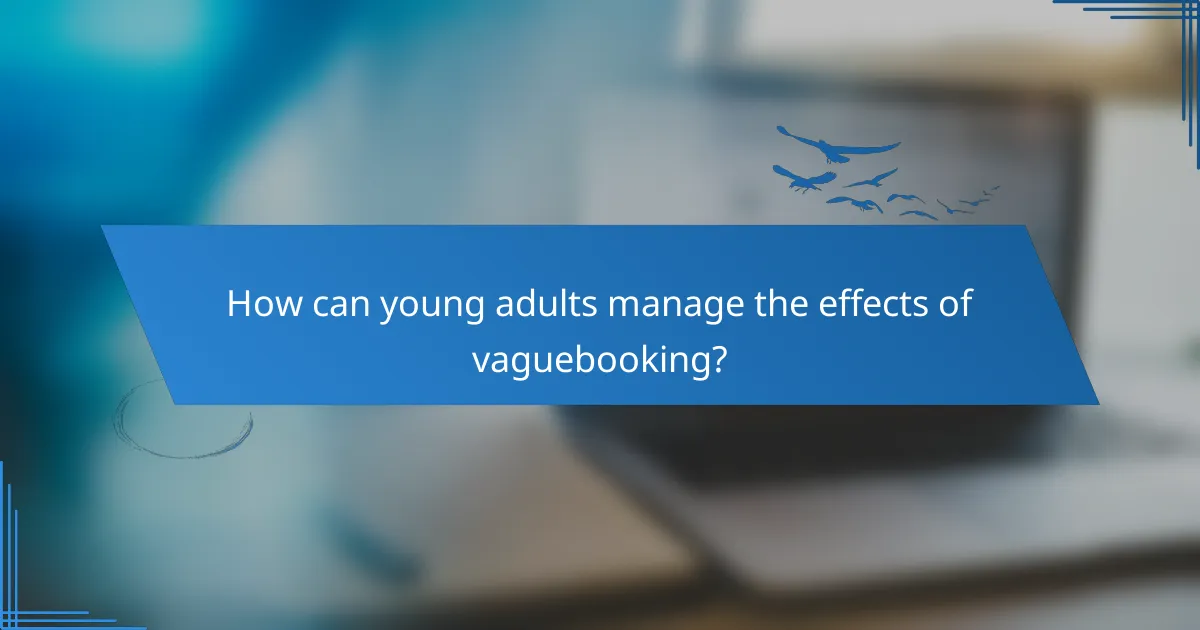
How can young adults manage the effects of vaguebooking?
Young adults can manage the effects of vaguebooking by implementing strategies that promote emotional well-being and reduce anxiety. This includes setting boundaries on social media use, seeking professional help when needed, and engaging in open communication with friends and family.
Setting social media boundaries
Establishing clear social media boundaries is essential for managing the emotional impact of vaguebooking. Young adults should consider limiting their time spent on platforms where vaguebooking occurs, aiming for a balanced approach that prioritizes real-life interactions over online engagement.
Practical steps include setting specific times for social media use, such as 30 minutes in the evening, and avoiding usage during meals or before bed. This helps create a healthier relationship with social media and reduces the likelihood of becoming overwhelmed by vague posts.
Seeking professional help
If vaguebooking leads to significant emotional distress, seeking professional help can be a beneficial step. Mental health professionals can provide support and coping strategies tailored to individual needs, helping young adults navigate their feelings and experiences.
Therapists may use various approaches, such as cognitive-behavioral therapy, to address underlying issues related to anxiety or self-esteem. Young adults should not hesitate to reach out for help, as mental health resources are widely available, including online therapy options that can be accessed from home.
Engaging in open communication
Open communication with friends and family can significantly alleviate the negative effects of vaguebooking. By discussing feelings and experiences related to social media, young adults can gain perspective and support from their loved ones.
Encouraging honest conversations about social media experiences can help identify triggers and foster a supportive environment. Young adults might consider setting up regular check-ins with friends to discuss their emotional well-being and share any concerns related to vaguebooking.
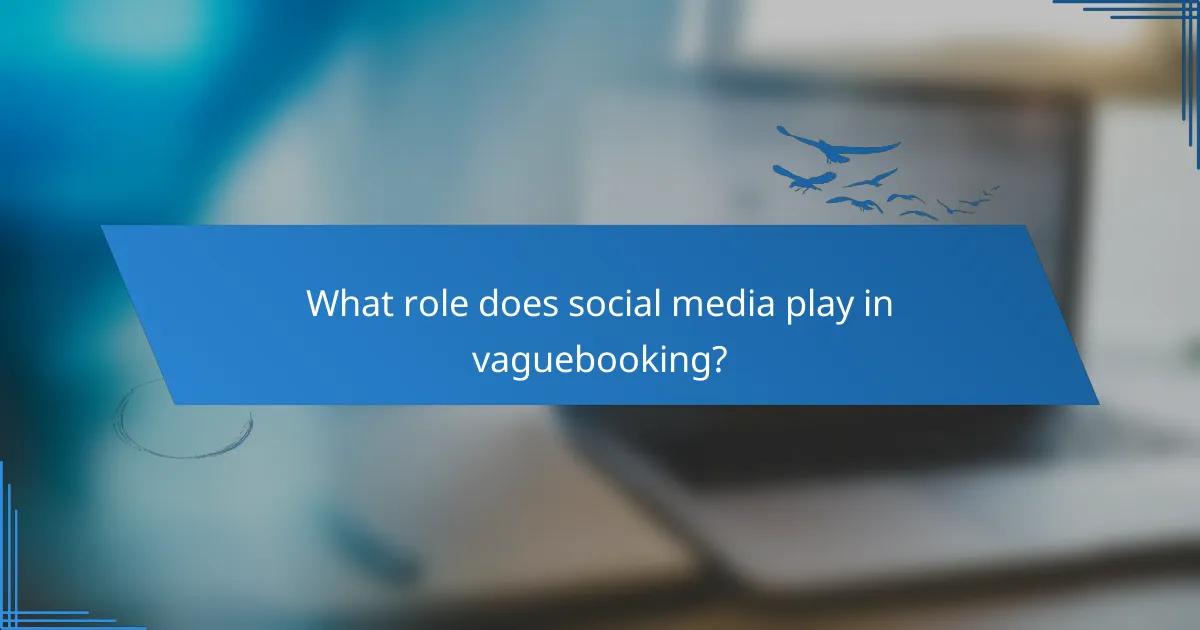
What role does social media play in vaguebooking?
Social media serves as a platform where vaguebooking occurs, allowing users to express ambiguous feelings or thoughts without providing context. This behavior can impact mental health, particularly among young adults, as it may lead to misunderstandings and emotional distress.
Platform-specific behaviors
Different social media platforms encourage unique vaguebooking behaviors. For instance, Twitter’s character limit often leads to cryptic posts, while Facebook allows for longer, more elaborate vague statements. Users may choose platforms based on the type of emotional expression they seek, impacting their overall engagement and emotional well-being.
On Instagram, vaguebooking often manifests through ambiguous captions paired with evocative images, which can elicit curiosity and concern from followers. This visual element can amplify emotional responses, making it crucial for users to consider the implications of their posts.
Influence of peer dynamics
Peer dynamics significantly influence vaguebooking behavior, as users often seek validation or support from their social circles. When friends engage with vague posts through likes or comments, it can create a feedback loop that encourages further ambiguous sharing, potentially heightening emotional turmoil.
Moreover, the fear of missing out (FOMO) can drive individuals to vaguebook, hoping to spark interest or concern among their peers. This can lead to increased anxiety and pressure to maintain an online persona that may not reflect their true feelings, complicating their emotional well-being.
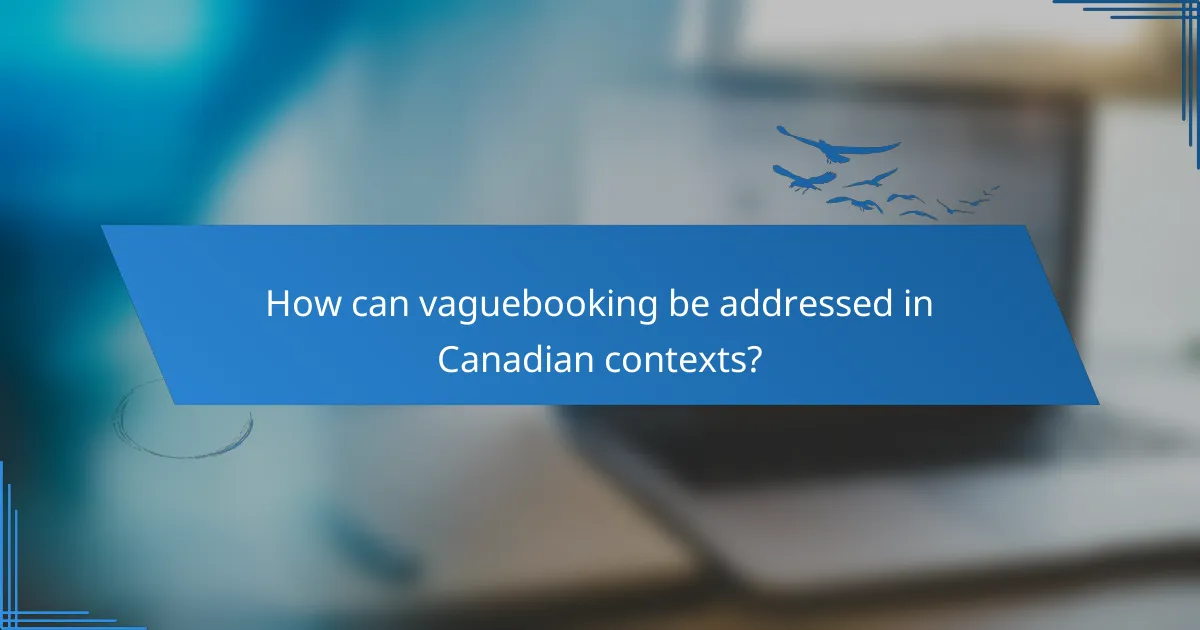
How can vaguebooking be addressed in Canadian contexts?
Addressing vaguebooking in Canada involves fostering open communication about mental health and promoting digital literacy among young adults. By creating supportive environments and educational resources, individuals can better navigate social media’s emotional landscape.
Community support initiatives
Community support initiatives can play a crucial role in mitigating the effects of vaguebooking. Local organizations can host workshops and support groups that encourage young adults to share their feelings and experiences in a safe space. These gatherings can help reduce the stigma around mental health and foster connections among peers.
Examples of effective initiatives include peer-led discussion groups and mental health awareness campaigns. These programs can be tailored to specific communities, ensuring they resonate with the unique cultural and social contexts of participants.
Educational programs on digital literacy
Educational programs focused on digital literacy can empower young adults to engage with social media more thoughtfully. By teaching skills such as critical thinking and emotional regulation, these programs can help individuals recognize the potential impacts of vaguebooking on their mental health.
Workshops could cover topics like understanding online communication, identifying emotional triggers, and developing healthy social media habits. Schools and community centers can collaborate to provide accessible resources, ensuring that all young adults have the opportunity to enhance their digital literacy.
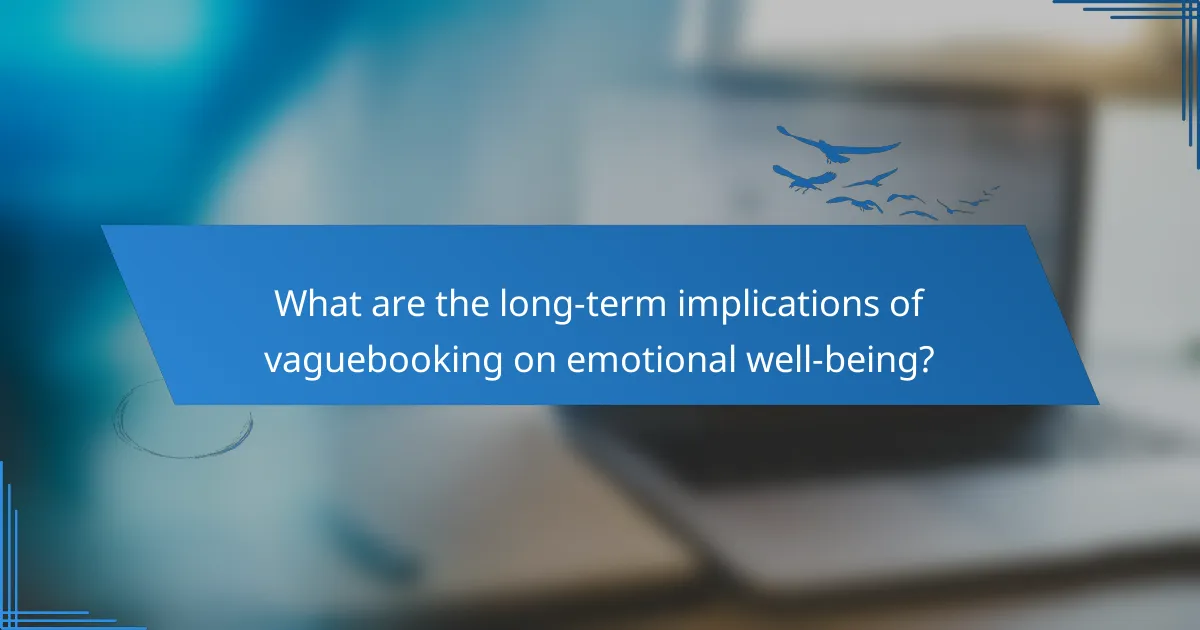
What are the long-term implications of vaguebooking on emotional well-being?
The long-term implications of vaguebooking can significantly affect emotional well-being, particularly among young adults. This behavior often leads to increased anxiety, feelings of isolation, and a lack of clarity in one’s emotional state.
Potential for chronic mental health issues
Vaguebooking can contribute to chronic mental health issues such as anxiety and depression. When individuals post ambiguous messages, they may inadvertently heighten their emotional distress by inviting speculation and concern from others, which can exacerbate feelings of loneliness.
Moreover, the uncertainty surrounding vague posts can lead to rumination, where individuals continuously dwell on their thoughts and feelings without resolution. This cycle can create a persistent state of emotional turmoil, making it harder to achieve mental stability.
Impact on relationships
The impact of vaguebooking on relationships can be profound, often leading to misunderstandings and mistrust. Friends and family may feel confused or concerned about the vague messages, which can strain communication and intimacy.
Additionally, if vaguebooking becomes a pattern, it may cause others to withdraw or avoid engaging with the individual, further isolating them. Clear and open communication is essential for maintaining healthy relationships, and vaguebooking undermines this foundation.
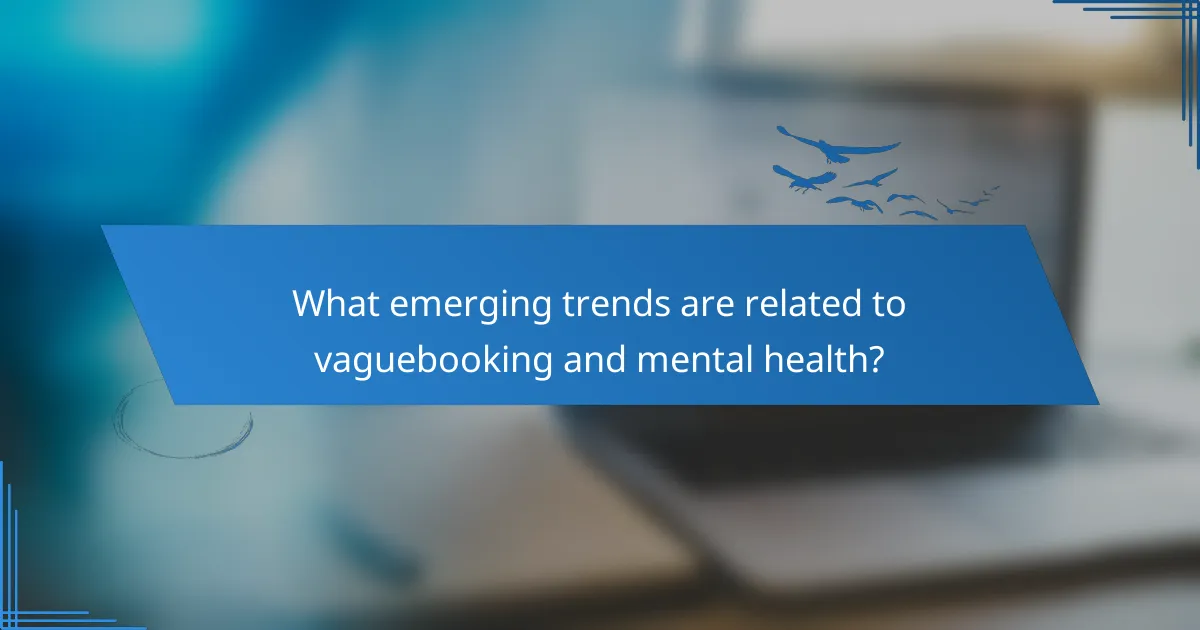
What emerging trends are related to vaguebooking and mental health?
Vaguebooking, the act of posting ambiguous or unclear updates on social media, is increasingly linked to mental health issues among young adults. This trend often reflects underlying emotional struggles and can lead to negative impacts on well-being, including anxiety and social isolation.
Increased Anxiety and Uncertainty
Vaguebooking can heighten anxiety among both the poster and their audience. When individuals share unclear posts, it may create a sense of uncertainty, prompting friends and followers to speculate about the underlying issues. This speculation can lead to increased stress for the person posting, as they may feel pressured to clarify or respond to inquiries.
Moreover, the lack of clear communication can exacerbate feelings of loneliness. Young adults may feel that their emotional needs are not being met, leading to a cycle of vague posts and further isolation.
Social Validation and Attention-Seeking
Many young adults engage in vaguebooking as a means of seeking social validation. By posting ambiguous updates, they may hope to elicit concern or attention from their peers, which can provide a temporary boost to their self-esteem. However, this approach can backfire, as it may lead to superficial interactions rather than meaningful support.
Attention-seeking through vaguebooking can also create a dependency on external validation, which can negatively affect emotional well-being. Instead of fostering genuine connections, it may result in a cycle of fleeting interactions that do not address the root causes of distress.
Impact on Relationships
The trend of vaguebooking can strain relationships among young adults. Friends and family may become frustrated or confused by unclear posts, leading to misunderstandings and potential conflicts. This lack of clarity can hinder open communication, which is essential for healthy relationships.
To mitigate these effects, it is important for individuals to consider the impact of their social media behavior on their relationships. Open and honest communication about feelings can foster stronger connections and reduce the need for vague posts.
Potential for Misinterpretation
Vague posts are often subject to misinterpretation, which can lead to unnecessary drama or conflict. Friends may jump to conclusions about the poster’s emotional state or intentions, resulting in misguided responses. This miscommunication can further complicate an already challenging situation.
To avoid misinterpretation, individuals should strive for clarity in their social media communications. When sharing feelings or experiences, being specific can help convey the intended message and reduce the likelihood of misunderstandings.
